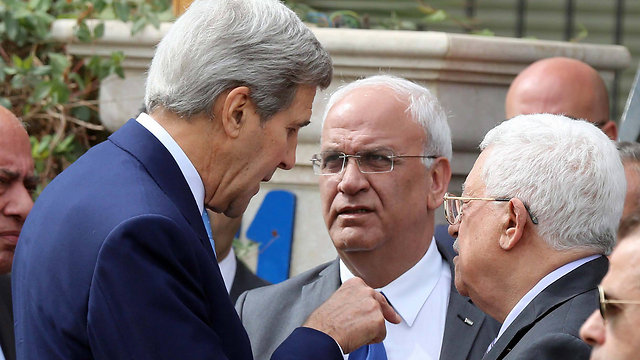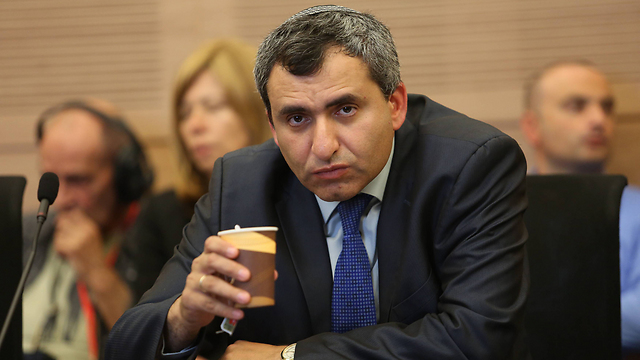
צילום: רויטרס
A conversation with Ze'ev Elkin on possibility of PA collapse
Op-ed: Immigrant absorption minister tells Nahum Barnea that Israel must begin planning for the day after the Palestinian Authority collapses; Elkin suggests that Israel should begin talks with local leaders and village councils about future arrangements.
Immigrant Absorption Minister Ze'ev Elkin planned to unleash a bombshell during his Bar Ilan speech on Monday, which took place six years after Netanyahu delivered a consequential speech at Bar Illan, cheerfully adopting the two-state solution. According to Elkin, the two-state solution has officially died and the future government of a Palestinian state, the Palestinian Authority, is on the verge of collapse. He postures that the PA will crumble with the retirement or death of President Mahmoud Abbas and that without the PA a state cannot be established.

"My central claim is that the likelihood the PA will collapse is high. Assessments suggest that the possibility of collapse sits between 40-95%. Israel cannot ignore this development: It needs to prepare for it…But they say that all of this is happening because of there is no political process. That is incorrect. The PA is falling apart because of internal Palestinian political matters. Abu Mazen was Arafat's natural successor and he consolidated his authority after the presidential elections. There is no natural successor to Abu Mazen or a way to hold elections."
I asked Elkin if government ministers want to strengthen the PA or bring on its collapse. Elkin responded, "That is not the question. The PA will collapse in either circumstance. There is no reason to give it an artificial existence, but if you are insisting: OK, let's breathe life into it, but we need to think ahead about the day after collapse simultaneously."
I told him that the IDF will not be eager to return to Ramallah or Nablus to assume responsibility for schools, hospitals, and plumbing in refugee camps. On the contrary, the IDF will undertake efforts to prevent the Palestinian governing authority's collapse.
Elkin retorted, "The IDF is held hostage by a concept. It fails to accept the fact that this will happen."
I then asked what will happen. He said, "There will be an internal war in Fatah, Hamas will take control, or there will be anarchy. There also may be local leaders who will assume responsibility, which is not a bad option."
I reminded him that Ariel Sharon previously tried to work with village councils and it ended disastrously.
Nonetheless, he insisted, "If we can organize these arrangements, we will fail. But if someone approaches us, we need to speak with him and study him today."
There is a seed of truth in Elkin's analysis: Since Abu Mazen announced that he intends to retire, a battle of succession has taken place. Possible successors are vying for the crown and want to end cooperation with Israel. Chief Palestinian negotiator Saeb Erekat again proposed ending security cooperation yesterday. He believes that such a move is his entry card to the next stage.

PA President Mahmoud Abbas, US Secretary of State Kerry and Chief Negotiator Saeb Erekat (Photo:EPA) (צילום: EPA)
Elkin wishes West Bank cities will transform non-contiguous Palestinian Bantustans led by local leaders, who cannot challenge Israel internationally. That did not work in South Africa nor will it work here.
The government still has not held a discussion on the future of the PA. Netanyahu prefers to maintain his policies or lack thereof. On the one hand, he promised the US State Department that he will prevent the collapse of the PA and is confirming the transfer for 500 million NIS to the Israel Finance and Defense ministers. On the other hand, he is presenting the PA as Israel's most bitter enemy.
I asked Elkin and Ofer Akunis, another Likud minister, about their opinions of the decision to transfer money to the PA. They expressed strong opposition.
"The threats that the PA is on the precipice of collapse are false." Akunis told me. "The PA is tricking us." The data reveals a different reality. International aid to the PA has decreased annually. Until 2012, international aid reached 1.2 million dollars annually. Today it has decreased to 800 million dollars. The US has stopped contributing and Western European states are threatening to follow suit. Those states say when the possibility of an agreement becomes nonexistent; they will no longer provide funds.
It is the dilemma: When there is no political horizon, the PA becomes weak. When the PA becomes weak, it will threaten to crumble.When it threatens to crumble, there will be no security for Israel. The PA is not our sub-contractor; we are working for ourselves.











